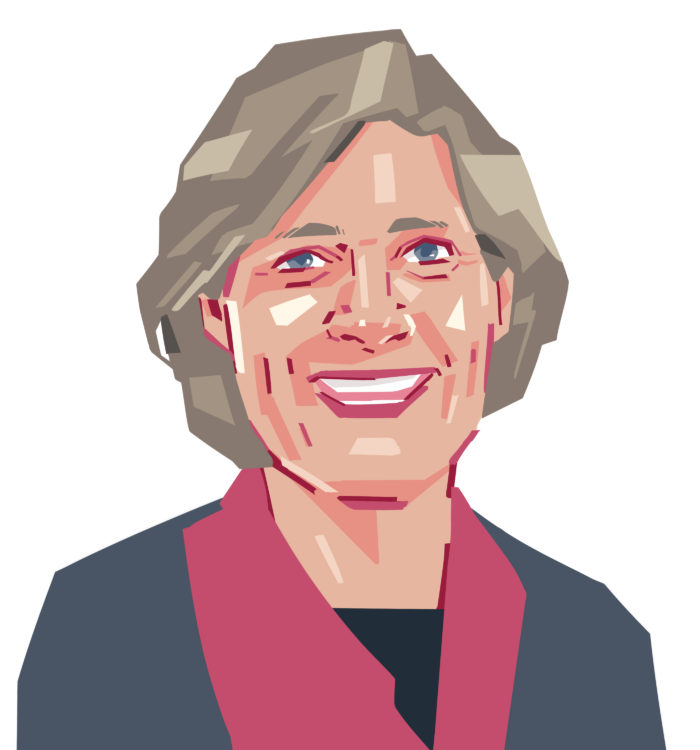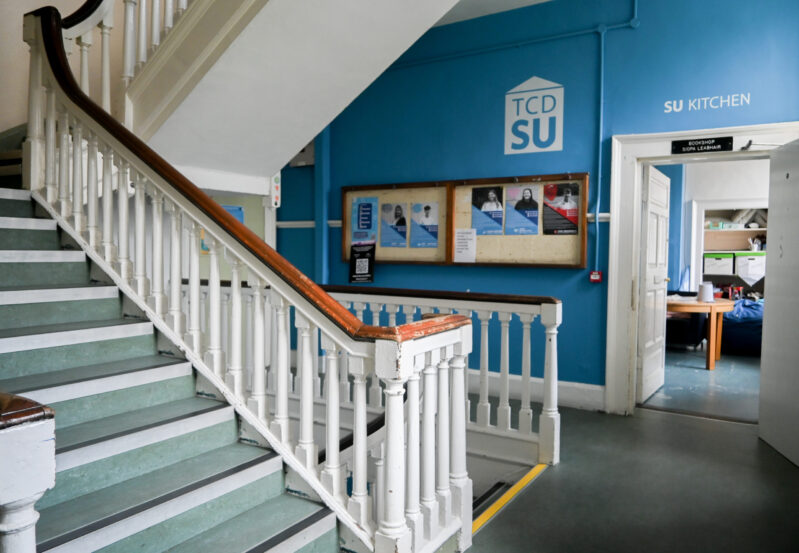Prof Cliona O’Farrelly is clear: she does not want this article to be about her path to the top. This much she makes apparent over the course of our conversation, during which we spend a great length of time discussing her path to the top.
O’Farrelly, a Trinity graduate, a professor in the College’s School of Biochemistry and Immunology and the first-ever female chair of the Fellows, also says she wants to put a framework in place to establish some terms of reference in order to set the piece off in the right direction. Following this, she proceeds to take our conversation on a million different micro-trajectories, stopping herself only sporadically when she remembers why she’s here and what she wants me to focus on.
If it sounds at this point as if O’Farrelly is a controlling interviewee, then it’s important to note that it doesn’t feel at all like this. Rather, it feels like an attempt from O’Farrelly to impose some order on a life that has what she understatedly calls “several niches”, and to make sure this piece is used not to highlight her own achievements, but to show students that life is much broader, richer and more complicated than it seems at a young age.
But O’Farrelly can’t stop herself from fully engaging with every question. At numerous points she’s almost on the verge of hopping out of her seat with excitement, so taken is she by what we’re discussing, while at others she’s uproarious at some story or reminiscence. She might want this piece to have some order, but our conversation certainly doesn’t – and, it must be said, it’s all the more enjoyable for that.
This is the secret, it seems, behind O’Farrelly’s likeability: she is irrepressibly good company. Prof Diarmuid Rossa Phelan, O’Farrelly’s predecessor as chair of the Fellows, says in an email that “no-one is immune to her benign enthusiasm”, and he’s not the only one to flag this part of her character. “Enthusiasm” is one of the first words people reach for when asked to describe O’Farrelly.
But it’s chaos, rather than enthusiasm, that O’Farrelly identifies as the trait other people are likely to associate with her – she says that “some people will probably say that I am” chaotic. And she certainly seems it.
She’ll often get caught up in a conversation and then look at her watch and realise she’s 30 minutes late to her meeting. That happens
Jamie Sugrue, a PhD student supervised by O’Farrelly, says her worst attribute is “probably her time-keeping. And that stems from her talking a lot. She’ll often get caught up in a conversation and then look at her watch and realise she’s 30 minutes late to her meeting. That happens”.
O’Farrelly does talk a lot – about everything. She tells me during our conversation that she harboured dreams to sail around the world at the age of 14, and that she wanted to train a Grand National winner in horse-racing. Then she flits to another topic. And then another. All the while, she speaks with a similar level of passion as she does when she is talking about immunology, the discipline to which she has devoted her professional life.
The extent to which she is able to throw herself into so many things at once is almost bewildering, and it’s something that prompts respect and admiration from her colleagues. Prof Kingston Mills, who works alongside O’Farrelly in the School of Biochemistry and Immunology, has known her for nigh-on 40 years, and he says one of her abiding strengths is her ability to see things clearly where others don’t: “When people say something can’t be done, she says: ‘Don’t be ridiculous – we’ll find a way to do this.’ She is absolutely brilliant at motivating people.”
It seems O’Farrelly has always had this innate belief in the power of the collective to solve problems – and even she isn’t quite sure where it came from.
“I don’t know why at the age of 18 I had such a strong image of what a university was” she says. “I loved the idea of a university being a collegiate collection of people together and all studying different things, but being exposed to different things. I had this notion that Trinity was the best example of this. It was only from books – Oxford and Cambridge – I knew Trinity was kind of like that.”
If there’s no single interest that defines O’Farrelly (she’s a voracious reader, as I find out to my cost when I fail to hold a conversation about literature, and she’s the honorary secretary of Amnesty International), then the closest she comes to nailing her colours to any one mast is when she begins to talk about Trinity.
They had to invent a new grade in physics, because there were a few of us in the class who failed so badly in our Christmas exams
Trinity clearly runs through O’Farrelly’s veins. It’s there in the happy childhood she doesn’t want this piece to waste time on, it’s there in the spells she spent in Sussex and Harvard and it’s there in the present day. Trinity and its environment, to which she returned in 2007 after 14 “fabulous” years working in University College Dublin’s St Vincent’s Hospital, are the things she comes back to time and time again – the first principles in a career that seems, on first reading, to have ignored them.
How did she end up in Trinity? Predictably, it’s a funny story. O’Farrelly, who had wanted to study architecture, was sitting in her bedroom in Adare, Co Limerick, flicking through the College’s prospectus. “And I discover that Trinity doesn’t have a school of architecture! I need to be at the post – I’m going to be cycling down to the village. I knew I had to have it finished for a quarter to five because I was cycling down to the village to post it. So I had to decide – this was about half three – what was I going to do? So I went through all the different things: law, English, languages, history. So finally it was by default. I really didn’t want to do law. I knew I was quite good at science but I hadn’t done physics so I was worried about it – I had only done chemistry and biology. So anyway I signed up for science.”
This, then, is how one of Ireland’s most successful and well-known scientists began her career. But if it seems surprising, then you haven’t been listening: so much of what O’Farrelly says circles back, eventually, to the idea of a diversity of interests. She’s a failure, she tells me cheerfully, in all sorts of things.
“It looks like I’m really successful and if you were to see my CV, it’s packed full of achievements. But what’s never recorded in a CV are all the things that didn’t work. They had to invent a new grade in physics, because there were a few of us in the class who failed so badly in our Christmas exams.”
O’Farrelly has been all over the world with her research: Prof Luke O’Neill, himself widely acknowledged as a world-leading immunologist, tells me that she “stands out internationally” for the quality of her work. But academia doesn’t even come close to capturing Cliona O’Farrelly. It’s her desire to help, above all, that defines her: her sense of community and her belief in its power. She references Trinity’s four graduate attributes – acting responsibly, thinking independently, developing continuously and communicating effectively – as tangible evidence of what Trinity’s community can give to the students who attend. It’s something she tries to impress on her students, she says.
It’s the same impulse, it seems, that prompted O’Farrelly to run for chair of the Fellows after a stint as secretary. In a typically ramshackle fashion, she spends five minutes attempting to put her finger on exactly what it is about the role that attracted her. It wasn’t the glory: she says that when she first started attending, “it was a group that did not seem to be really cohesive. The first Fellows meetings that I went to seemed to be dominated by conversations about pensions and parking. And I couldn’t understand that a body as potentially influential as the Fellows would be spending their time on such trivia”.
Years later, she’s now at the helm, and she says “there’s a real sense of the body of Fellows really wanting to contribute to the university” at a time when things are not easy for higher education. You sense that O’Farrelly will want to contribute to Trinity in a multitude of ways for years yet.
It’s Prof Lydia Lynch, another immunologist with ties from Trinity to Harvard and someone whose PhD was supervised by O’Farrelly, who sums her up best. “She’s like my mam”, she says simply. “Without Cliona I don’t know what I would do … because of her I have everything that I have, because of Cliona. She even helped my husband get back into reading, and he’s an electrician! She just helps.”







